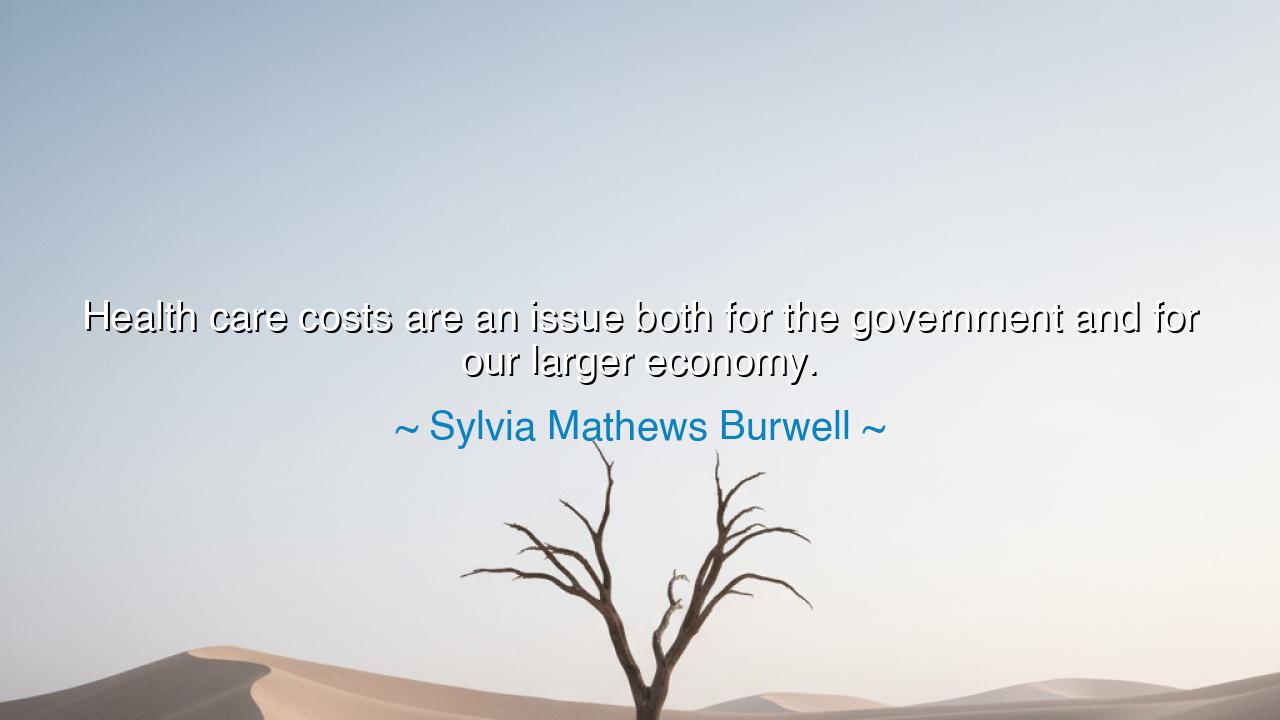
Health care costs are an issue both for the government and for






In an age when the health of nations has become as fragile as the health of their people, the stateswoman Sylvia Mathews Burwell spoke with calm wisdom and sharp foresight:
"Health care costs are an issue both for the government and for our larger economy."
Though her words may seem simple, they carry the weight of generations — for they speak to the delicate bond between a people’s well-being and the strength of their nation. Burwell, who once served as the United States Secretary of Health and Human Services, understood that the health of a nation is not measured by its armies or its wealth alone, but by the condition of its citizens — by whether the mother can afford medicine for her child, whether the laborer can find healing after toil, whether the elder can age with dignity and without fear. Her words remind us that health care is not merely a service, but a sacred trust that binds the prosperity of a people to the morality of their governance.
The meaning of her declaration cuts to the core of economic and moral truth. A nation’s economy is not a creature apart from its people — it is the sum of their labor, their creativity, and their vitality. When citizens fall ill and cannot afford care, productivity withers, hope diminishes, and the fabric of society begins to fray. The government, in turn, must shoulder greater burdens: lost revenue, rising deficits, and the anguish of a people who feel abandoned by the institutions meant to protect them. Thus, health care costs are not a problem confined to doctors and patients; they are the pulse of the nation’s future. A healthy population is a strong economy, but a sick population is a slow poison that seeps into every corner of national life — weakening not only the body, but the spirit.
The origin of Burwell’s insight lies in the hard lessons of her time. Serving during a period when the United States wrestled with rising medical costs, she faced the truth that even a prosperous nation could falter under the weight of inefficiency and inequity. The government’s struggle to balance compassion with sustainability became a test of its character. It was not enough to heal the body; the system itself needed healing. Her leadership reflected an ancient understanding — that the prosperity of rulers depends on the health of the ruled. From the dawn of civilization, wise leaders have known this: the granaries of Egypt were not filled by sick farmers, nor were Rome’s roads built by citizens weakened by neglect. Health has always been the invisible pillar upon which power stands.
To grasp the full wisdom of Burwell’s words, let us remember the story of postwar Europe. In the aftermath of destruction, nations like Britain rose again not only by rebuilding their industries, but by rebuilding the human spirit through universal health care. When the National Health Service was born in 1948, it was more than a policy — it was a promise: that no one would be left to suffer because of poverty or fate. The result was not merely improved well-being, but an era of economic renewal and social unity. Workers grew stronger, children lived longer, and a wounded people regained their confidence. This history reveals what Burwell’s quote implies: that health and prosperity are two halves of the same whole, and that compassion is not the enemy of progress, but its engine.
Her words also carry a warning — that if governments ignore this truth, they invite decline. When health care becomes a luxury, society becomes cruel; when illness becomes debt, freedom itself grows fragile. Every untreated sickness, every life cut short by neglect, is a hidden tax upon the economy and a wound upon the nation’s conscience. The burden grows not only on ledgers, but on hearts. Burwell’s insight urges us to see beyond numbers and budgets: a nation’s true wealth lies in its people’s capacity to live fully and contribute freely. No policy is more patriotic than one that ensures the strength and dignity of every citizen.
Yet, her teaching is not for governments alone — it is for each of us. For the larger economy begins in the smallest act: how we care for one another, how we invest in health, how we value the lives of those who labor quietly around us. The great societies of history were not those that hoarded gold, but those that tended to the weak and uplifted the sick. It is within families, communities, and workplaces that the cycle of health and prosperity is sustained. When individuals take responsibility for wellness — through prevention, education, and compassion — they lighten the burdens of the whole.
So let this teaching be carried forth as a lamp for the generations: health is the foundation of freedom, and freedom is the fruit of well-being. A wise government will never see medicine as an expense, but as an investment in the nation’s future. A wise people will never see health care as charity, but as the shared heartbeat of their civilization.
Thus ends the teaching: the measure of a government is not in the grandeur of its buildings or the might of its armies, but in the vitality of its people. Let every leader, every citizen, remember Burwell’s truth — that to guard health is to guard prosperity, and to neglect it is to invite the slow decay of the body, the economy, and the spirit of the nation itself.






AAdministratorAdministrator
Welcome, honored guests. Please leave a comment, we will respond soon